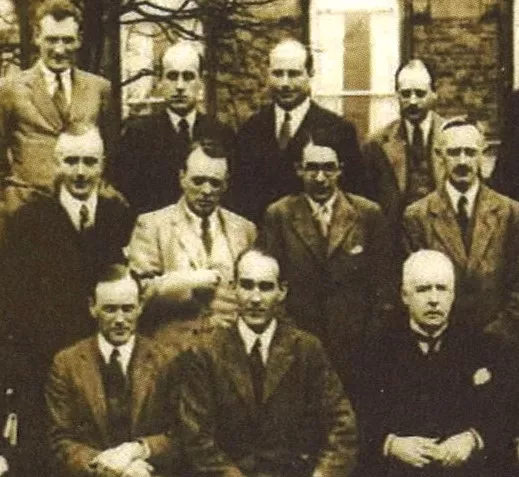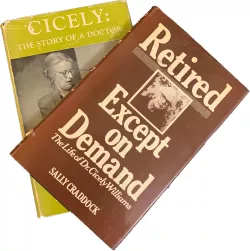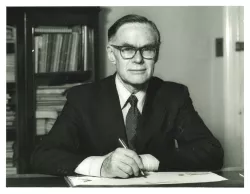
At least one third of the members pictured in this image of the BPA’s second AGM in April 1929 saw active service during the First World War.

(RCPCH Archive Reference: RCPCH/004/001/031)
Donald Paterson, driving force behind the establishment of the British Paediatric Association, served in the army for three years. Starting at the Battle of the Somme in 1916 he spent two years with 1st Dorset Regiment in France then a year as pathologist in the Canadian Army Hospital at Taplow.
Leonard Parsons was a founder of the BPA and published valuable papers on nutritional disorders, especially rickets and scurvy, and on the haemolytic anaemias of childhood. He saw service as a major in the Royal Army Medical Corps in Greece and Serbia and was attached to the Serbian Army, for which he received the Serbian Order of St Sara in 1917.
James Spence, widely known for his work in the field of social paediatrics and namesake of the RCPCH’s highest honour (the James Spence Medal), served with the Royal Army Medical Corps in Gallipoli, France and Belgium. He received the Military Cross for conspicuous gallantry and devotion to duty in attending wounded while under fire, and later received a bar to his MC.
Arthur Griffith Maitland-Jones was BPA Honorary Secretary 1934-1943 and President 1949-1950. Due to his wartime service in the Royal Army Medical Corps he was awarded the Military Cross, was twice mentioned in dispatches, was made an OBE and was given the Croix de Guerre. One dispatch stated that he repeatedly reconnoitred the roads under heavy shell fire, resulting in the rapid evacuation of wounded soldiers from exposed positions.
Charles McNeil, instrumental in the development of the field of child health, served in the Royal Army Medical Corps in command of the Scottish Hospital in Rouen from 1915 to 1919.
During the Second World War, the BPA and its members undertook important work in the UK (see our subject archive guide on WWII and 'A carrot a day' blog), while some members made notable contributions overseas.

Cicely Williams won the James Spence medal for her contributions in the field of tropical paediatrics and was the first director of Mother and Child Health at the World Health Organisation. During the war, Williams was interned at the Changi Prison in Singapore where she provided medical care to those in the camp. She was camp dietitian and head of the camp, and wrote a paper later published as Nutritional Conditions among Women and Children in Internment in the Civilian Camp at Singapore. For five months she was held in the Kempeitai Prison with tortured and dying men after she was accused of being a spy when the Kempeitai inferred her medical notes to be coded messages. Nonetheless, Williams noted of her time in the Changi camp ‘20 babies were born, 20 babies were breastfed, 20 babies survived, you can’t do better than that’.
Robert Hugh Jackson was awarded the James Spence medal in 2000 for his work in preventing child injury. He is most widely known for his successful campaign to adopt child-resistant packaging in the UK and for preventing choking on pen lids. He was a Medical Officer on the front line during the Second World War and was awarded the Military Cross for treating and rescuing 18 men in a house being used as a shelter which had been shelled and was still under bombardment – all those he treated survived.

(RCPCH Archive Reference:
RCPCH/010/001/224)
John Forfar was BPA President 1985-1988 and was instrumental in negotiations resulting in the creation of the RCPCH. He was awarded the James Spence medal for outstanding contributions as both an academic and general physician in 1983. Forfar enlisted with the Royal Army Medical Corps during the Second World War and volunteered with the 47 Royal Marine Commando Unit. He was part of the Normandy landings in 1944 and was awarded the Military Cross for tending to wounded Commandos under heavy fire in the Netherlands. He later wrote a book on the unit’s actions during the war entitled From Omaha to the Scheldt: The Story of 47 Royal Marine Commando.
You can read more about the history of the RCPCH. Our archives contain records of our history as the British Paediatric Association (BPA) and a Royal College, as well the development of paediatrics and child health more widely. We welcome enquiries from our members and the general public. If you have any questions or you would like to access our archives, please contact us at information.governance@rcpch.ac.uk.









